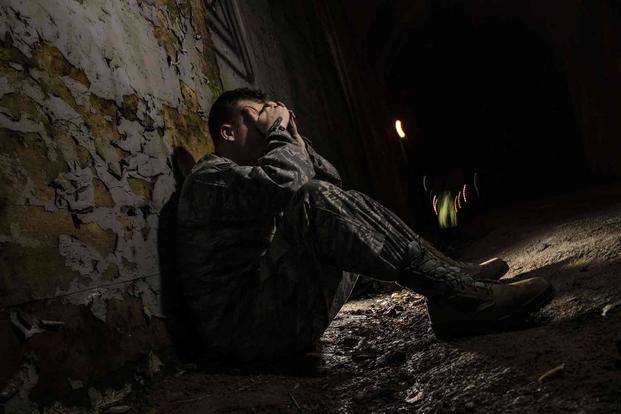Suicide among post-9/11 veterans rose more than tenfold from 2006 to 2020 even as the rate remained relatively flat in the general U.S. adult population, according to a new review of 2.5 million service member records.
The findings were even more startling for veterans diagnosed with a traumatic brain injury – those veterans had suicide rates 56% higher than those without a head injury and three times higher than the general population.
That U.S. veterans struggle with brain injuries, mental health conditions and suicide is not news. Military service was, before 2008, a protective factor against suicide, with troops having lower rates than their civilian counterparts. But since that year, which coincided with a surge in combat operations in Iraq and Afghanistan, suicide rates have risen steadily, despite enormous efforts by the Departments of Defense and Veterans Affairs to prevent the deaths.
Read Next: 8 US Marines Remain in a Hospital After a Fiery Aircraft Crash Killed 3 During Drills in Australia
The retrospective study, published Monday in JAMA Neurology, appears to show that those multimillion-dollar suicide prevention initiatives and programs have had little impact.
"We were pretty stunned, honestly. Even though this is just a descriptive analysis, the trends are so alarming we felt we needed to report it as soon as possible," said Jeffrey Howard, an associate professor of public health at the University of Texas at San Antonio who led the study.
The study looked at the records of military veterans who served on active duty after Sept. 11, 2001, and had received three years of medical care through the military health system or at least two years at the VA.
The researchers found that from 2006 to 2020, 8,262 veterans died by suicide while 562,411 civilians died by suicide, which translate – a rate of roughly 42 per 100,000 for veterans versus roughly 18 per 100,000 for the general population when looking at the groups across the 15-year time frame.
The rates were highest among those ages 35 to 44, followed closely by the 25- to 34-year-old group, and among Native and Alaskan Americans, Asians and Pacific Islanders, and veterans with traumatic brain injury.
The findings build on work published in February 2022, also by Howard, that found veterans with even mild traumatic brain injury, as well as those with moderate to severe injuries, were more likely to die by suicide, accidents or homicides than their counterparts who had never received blows to the head.
In an email Monday to Military.com, Howard said his researchers published the brief because they had received an update of the national death index data through 2020 and the group was interested to see how the rates may have been affected by the COVID-19 pandemic.
But when they looked at the rate trend, what "really stood out was just how dramatically they had increased over the past 15 years."
Military.com delved into the complex relationship between traumatic brain injury and suicide in a three-part series. It focused on those affected, the Defense Department's response to the increase in head injuries among troops, and subsequent care and treatment of affected service members in the military health system and Department of Veterans Affairs.
The VA reported a decrease in suicides among U.S. veterans in 2020, down 10% from a peak in 2018. That report, which examined the total veteran population, found that the rate for suicide among veterans was more than double the rate of non-veteran adults in the U.S. in 2020, but showed a larger drop than the rate for the general population -- a 9.7% decline from 2018 compared with a 5.5% drop in the general population.
The research published Monday, however, found that the rate has continued to climb since 2018 for post-9/11 veterans.
The authors theorize that the rise in suicide among this population may be the result of increases in mental health diagnoses, substance misuse, and the availability and access of firearms, the most utilized method for suicide among veterans.
Limitations that may have skewed the results include misclassifications of death, such as not identifying a death as a suicide, underreporting of TBI, and that the research did not include veterans who left the service in less than three years or who had not received care care at the VA.
Howard said one of the biggest takeaways from the study is that the current approaches and efforts to prevent suicide in th military and veteran population do "not appear to have impacted the trend," which he acknowledged is discouraging but "important to know."
"I think this points to the need to reevaluate how we are going about trying to reduce suicide," Howard said. "I think it is not solely a clinical solution, but there is a need for a much broader, multifaceted approach."
If you are a service member or veteran who needs help, it is available 24/7 at the Veterans and Military Crisis Line, call or text 988 or chat 988lifeline.org, or through the online chat function at www.veteranscrisisline.net.
– Patricia Kime can be reached at Patricia.Kime@Military.com. Follow her on Twitter and Threads @patriciakime.
Related: From Hormones to Horses: How Veterans Are Finally Getting Help for Brain Injuries













